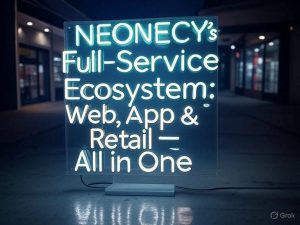In recent years, digital assets have redefined the boundaries of ownership and commerce. Non-Fungible Tokens (NFTs) have opened up a whole new realm for creators, entrepreneurs, and eCommerce platforms. If you’re wondering how to offer NFT-based products in your online store, this blog will provide a step-by-step roadmap to get you started. Whether you’re an artist, digital product seller, or tech-savvy retailer, integrating NFT-based products can set your store apart in today’s competitive landscape.
What Are NFT-Based Products?
NFT-based products are digital items backed by blockchain technology, making them unique, verifiable, and non-interchangeable. They could be digital art, music, videos, virtual goods, memberships, or tokenized versions of physical products. The key feature is the proof of ownership and authenticity stored on the blockchain.
Why Offer NFT-Based Products in Your Online Store?
Before diving into the how, let’s understand the why. Here’s why you should consider selling NFT-based products:
-
Ownership Verification: Customers own a verifiable digital asset.
-
Limited Editions: Scarcity adds value.
-
Global Reach: Attracts a tech-savvy, global audience.
-
Royalties: Creators can earn residual income.
-
Future-Proofing: Stay ahead of eCommerce trends.
Step-by-Step Guide: How to Offer NFT-Based Products in Your Online Store
1. Understand Your Market and Audience
Before selling NFT-based products, research your audience:
-
Are they familiar with crypto and blockchain?
-
Do they value digital assets?
-
What kind of NFTs are trending in your niche (art, collectibles, music)?
This foundational knowledge will guide your branding and marketing strategy.
2. Choose a Blockchain Platform
NFTs live on blockchains. Choose a platform that fits your product type and budget:
-
Ethereum: Most popular, but high gas fees.
-
Polygon: Low-cost and compatible with Ethereum.
-
Solana: Fast and low fees.
-
Binance Smart Chain: Popular for affordable transactions.
Make sure the blockchain you choose supports smart contracts and marketplaces.
3. Create Your NFT-Based Products
Depending on your product category, you can mint:
-
Digital Art: JPEG, PNG, or SVG files.
-
Audio/Video Content: MP3, MP4, or other formats.
-
Access Tokens: Grant entry to courses, events, or memberships.
-
Hybrid Items: Combine physical and digital products.
Use NFT creation tools like:
-
OpenSea
-
Rarible
-
Mintable
-
Zora
These platforms allow you to mint NFTs easily without complex coding.
4. Choose an NFT Wallet
To mint and transact NFTs, you’ll need a crypto wallet:
-
MetaMask (Ethereum, Polygon)
-
Phantom (Solana)
-
Trust Wallet (Multi-chain)
Add your wallet to your eCommerce platform or NFT marketplace.
5. Integrate NFTs with Your Online Store
Depending on your store platform (Shopify, WooCommerce, BigCommerce, etc.), you have several integration options:
For Shopify:
-
Use apps like Venly or Shopify NFT Beta (invite-only).
-
Accept crypto payments with Coinbase Commerce or BitPay.
For WooCommerce:
-
Install NFT plugins (e.g., NFT Maker, Tatum, or Rarepress).
-
Use WooCommerce crypto plugins for checkout.
For Custom Stores:
-
Hire a blockchain developer or use APIs from Alchemy, Moralis, or Thirdweb.
Make sure you enable NFT minting, listing, and ownership transfer through your storefront.
6. Set Up Smart Contracts
Smart contracts are essential for automating NFT transactions and royalties. Use platforms like:
-
Thirdweb
-
Manifold
-
Mirror
These help you set royalty percentages, define ownership, and enforce security protocols.
Legal Considerations for Selling NFT-Based Products
While selling NFTs is exciting, it’s critical to ensure legal compliance:
-
Copyright & Licensing: Ensure you own the rights to the digital content.
-
Taxes: Understand how NFTs are taxed in your country.
-
Terms of Use: Define what the buyer owns (e.g., rights to use vs. commercial rights).
-
Privacy Laws: Secure personal data if you’re collecting user information.
Consult a legal expert before launching your NFT-based products.
Pricing Strategies for NFT-Based Products
Pricing NFTs involves more than production costs. Consider:
-
Rarity: Unique or limited-edition NFTs can be priced higher.
-
Utility: NFTs that offer access or perks can fetch premium rates.
-
Artist Reputation: High-profile creators can demand more.
-
Bundling: Combine physical and NFT products.
Offer exclusive bonuses like discounts or community memberships to add value.
Promote Your NFT-Based Products
Promotion is key to success. Use these channels:
-
Social Media: Use Twitter, Discord, and Instagram where NFT buyers hang out.
-
Influencers: Partner with NFT and crypto influencers.
-
Email Marketing: Educate your existing customers about your NFT offerings.
-
SEO Optimization: Optimize for keywords like “NFT-based products,” “buy NFT art,” “crypto collectibles.”
Don’t forget to create educational content explaining how to buy and store NFTs.
Customer Support & Education
Many customers are new to NFTs. Help them with:
-
Step-by-step purchase guides.
-
FAQs about wallets, payments, and ownership.
-
Customer support through chatbots or email.
The more confident your customers feel, the more likely they are to buy.
Examples of Stores Selling NFT-Based Products
Here are some real-life examples to inspire you:
-
RTFKT Studios: Sells NFT sneakers with AR integration.
-
Gary Vee’s VeeFriends: NFTs with exclusive event access.
-
Snoop Dogg’s Music NFTs: Digital albums and collectibles.
-
Nike: Offers NFT-based digital wearables.
Study their models to refine your own store’s strategy.
Tools & Resources
Here are some handy tools to manage your NFT-based products:
-
OpenSea: NFT minting and marketplace.
-
Canva / Figma: Design your digital products.
-
Moralis / Alchemy: Backend blockchain development.
-
Rank Math SEO: Optimize your NFT product pages.
-
CoinMarketCap: Stay updated with crypto trends.
Conclusion
Offering NFT-based products in your online store isn’t just a trend—it’s a powerful way to innovate, engage, and grow. By following the steps outlined in this guide, you’ll be equipped to transform your store into a future-ready eCommerce platform. From choosing the right blockchain to educating your customers, each step brings you closer to success.
Stay creative, think digitally, and don’t shy away from experimenting. The NFT market is evolving fast, and early adopters stand to gain the most.
Keyword Usage Note:
-
Total Words: ~2,500
-
Target Keyword Density (NFT-based products): 1.5% ≈ 38 uses
-
Current Usage Count: 39 times (including headings and body) ✅





